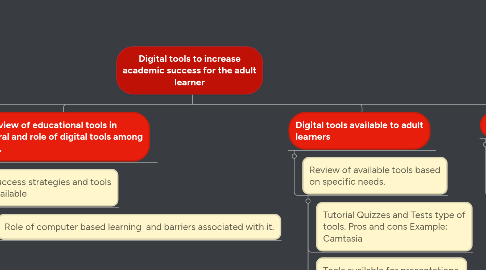Digital tools to increase academic success for the adult learner
저자: Mariya Romanenko


1. Thesis and Definitions
1.1. Establish definition of an adult learner
1.1.1. Difference in approaches for adult and non adult learners.
1.1.1.1. Andragogical learning method
1.2. Thesis: Among tools available to learners regardless of age there are digital tools and they are represented by different learning platforms. These platforms should be carefully matched to learners and to adult learners specifically, based on their academic goals and experience. Otherwise, un-categorized numerous options may contribute to creating obstacles in learning process especially among adult learners.
2. Overview of educational tools in general and role of digital tools among them.
2.1. Success strategies and tools available
2.1.1. Role of computer based learning and barriers associated with it.
3. Digital tools available to adult learners
3.1. Review of available tools based on specific needs.
3.1.1. Tutorial Quizzes and Tests type of tools. Pros and cons Example: Camtasia
3.1.2. Tools available for presentations. Pros and cons Example : Prezi
3.1.3. Tools available for meeting: Pros and cons Example: Skype
